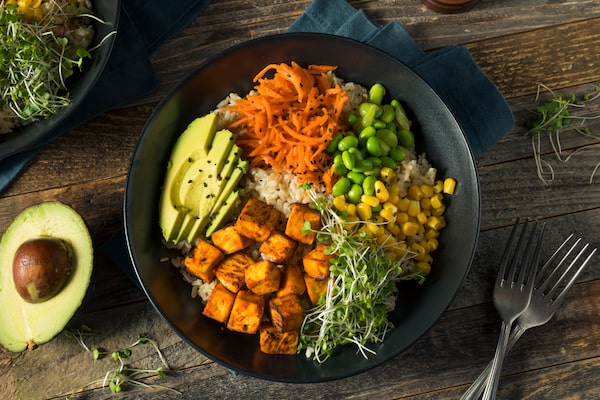If you're craving something sweet after dinner, opt for a nutritious dessert such as a baked apple with dried cherries and maple syrup, homemade rice pudding or stewed fruitGetty Images/iStockphoto
The question: I always crave sweets after eating a meal, despite feeling full. How can I prevent this?
The answer: As a dietitian in private practice, this is a question I am often asked by clients trying to control their weight. Some people don’t feel satisfied unless they finish their meal with something sweet, even if they don’t feel hungry. In order to prevent sweet cravings in the first place – or to successfully manage them – it’s important to understand what’s causing them.
For many people, eating dessert (or chocolate) after meals is a habit. Rather than a physiological sugar craving, the desire occurs simply because you’re used to ending your meal with a sweet. It’s something you want versus something your body actually needs.
When you eat your calories may help weight loss, new research shows
Unbalanced meals that lead to an uneven blood-sugar level may also be to blame. For example, a meal comprised primarily of refined starchy foods that are quickly digested (e.g. white bread, white rice, refined cereals) will cause your blood sugar (glucose) to spike after eating. Soon after eating, this glucose soar is followed by a drop, causing you to crave sugar.
Sugar cravings that strike after a meal may be due to serotonin, a feel-good brain chemical that's associated with an elevated mood. Eating a sugary dessert causes serotonin levels to rise in the brain, which can make you feel calmer and happier.
In some cases, a strict diet that avoids all sweets is the culprit behind sweet cravings. Denying yourself sweets that you enjoy can trigger – and intensify – cravings.
If you think one of these reasons is behind your sweet cravings, follow these eight strategies to help you control them.
1. Break the habit
Understand that cravings pass. Remove yourself from the situation for 30 minutes to see if your craving subsides. Go for a walk or do a short workout. Exercise improves mood, possibly by boosting serotonin levels.
2. Brush your teeth
Immediately after eating, brush you teeth to help dampen after-meal sweet cravings.
3. Satisfy your sweet tooth naturally
Add natural sweetness to meals with side dishes such as mashed sweet potato (add a splash of orange juice and a dash of cinnamon), spinach salad with sliced strawberries or orange segments, or a whole-grain pilaf with dried cranberries or chopped dried apricots.
Anti-inflammatory diet may be best to slow cognitive aging
4. Finish your meal with a nutritious sweet dessert
Try a baked apple with dried cherries and maple syrup, homemade rice pudding or stewed fruit.
5. Eat balanced meals
Add slowly digested, or low-glycemic index (GI), carbohydrate foods to meals to help keep your blood-sugar level stable after eating. Low GI foods include 100-per-cent stone-ground bread, brown rice, wild rice, quinoa, sweet potato, new potatoes, legumes and most types of fruit.
6. Eat high-protein foods throughout the day
To suppress appetite longer after meals, include a source of protein at breakfast, lunch and dinner such as egg whites, Greek yogurt, poultry, fish, lean meat, tofu and legumes.

To feel fuller after meals, add protein like tofu and egg whites to your meals.iStockPhoto / Getty Images
7. Sweeten your breakfast
Research suggests that adding a small serving of something sweet to breakfast – a square of chocolate, a candy, or even a cookie – prevents sweet cravings later in the day. The theory: When you wake up in the morning, serotonin levels are at their highest and cravings are the lowest. That means eating a sweet with breakfast, when serotonin levels are already high, won’t give your brain the same serotonin boost. Without the feel-good association, cravings later in the day will be reduced.
8. Don’t ban treats
Include dessert in your diet once a week to prevent feeling deprived. If your sweet craving is persistent, give in sometimes to prevent your urge becoming more intense.
Leslie Beck is a registered dietitian.
 Leslie Beck
Leslie Beck